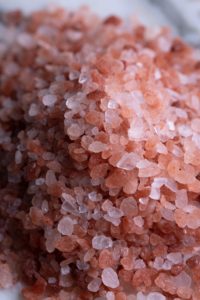Overcoming The Keto Flu Blues
This post may contain affiliate links. Learn more.
Deze post kan affiliate links bevatten. Lees meer.
You have decided to eat a low-carb diet and take on the keto challenge. This is great news! But today we want to talk a little bit about the “keto flu”. What is the keto flu exactly, what are the causes, symptoms and how can you beat it?
We’ll give you some tips to overcome the common hurdles you can face when starting a ketogenic lifestyle. So that you are ready to lose weight, feel better, boost energy and improve your overall health!

What Is the Ketogenic Diet?
First things first, let’s look at what this diet is really all about.
The ketogenic or “keto” diet is an alternative dietary system defined by cutting back on or eliminating most carbohydrates. While on the keto diet, individuals are focused on eating predominately low-carb, nutrient-dense foods to lose weight and regain health.
While one eats in this fashion, their body goes into a natural state called ketosis. Ketosis enables the body to utilize ketones in place of carbohydrates for energy. When in ketosis, the body is optimized to burn fat.
You’ve Been in Ketosis Before
Did you know that when we were in our mother’s womb we were in a state of ketosis?! Yes indeed, we have all been on the ketogenic diet before!
In fact, even after an infant is born, it continues to stay in ketosis as it nurses from its mother. Human breast milk is mostly fat. It is this fat that enables a growing baby to thrive and build bodily systems.
To go even further, babies that are breastfed and get to remain in ketosis longer, have larger brains and superior overall development when compared to babies that are immediately bottle-fed with synthetic formula.
Ketosis is just like riding a bike; our body will always remember how to do it. Let’s keep this in mind as we prepare to make this amazing dietary change for the improvement of our health. With these Keto Sticks you can see if you are in ketosis.
Read more about the Keto Diet Basics.
What Is the Keto Flu and How Long Will It Last?
After about 3 – 4 days of starting your keto journey, you may start to experience what’s called the “keto flu”. Keto flu is a group of symptoms that your body experiences during the beginning of a ketogenic diet plan. Some of the common symptoms are headache, nauseous, dizziness, stomach pain, sugar craving, and poor concentration.
As the body adapts to burning ketones for fuel, you may experience a few symptoms as your body transitions. These symptoms can last between one to four weeks as your body adapts to efficiently producing ketones for fuel.
Everyone’s experience is different and may depend upon your initial health when adopting this new lifestyle.
During this time, your body is literally learning how to switch engines. Your body is transitioning from burning carbohydrates for fuel to that of burning ketone bodies instead.

Signs and Symptoms of Keto Flu?
There are many kinds of symptoms that could occur during the beginning of the keto diet. When I started my keto diet last year, I had a bad headache and felt dizzy the first week. As someone who loves carbs like a baguette, pasta, and oatmeal, my body was extremely stressed that I suddenly changed my diet.
I also felt nauseous and decreased concentration, because I couldn’t focus on a task for not even an hour. For me, the first two weeks were the most challenging.
As your body is having a change of the guard and switching its fuel source, you may notice the following keto flu symptoms:
- Headache
- Fatigue, Weakness, Lethargy
- Dizziness or Feeling Light Headed
- Muscle Cramps - add back in more minerals and electrolytes
- Itching and/or Rash
- Irritability, Moodiness, and Brain Fog
- Digestive problems: Constipation or Diarrhea
- Insomnia
- Body Ache
- Spasms
- Chills
- Nausea
- Stomach pains
- Depression and Anxiety
There will be major changes to your insulin levels when you first begin your keto-induced carb detox. Your body may be used to having high insulin levels. After time, this will normalize.
Therefore, you will likely have heavy fluid retention in your tissues. Most people often experience losing 1- 5 liters / 3 – 10 pounds of water weight during the initial transition phase into ketosis. The more overweight you are, the more water weight you will lose.
Causes the Keto Flu
So you might wonder: what is causing the keto flu?
Switching from carbs to ketones
When people switch over to fueling their bodies with ketones in place of carbohydrates, they often begin to experience the keto flu.
This may be because, for decades, most people have been consuming a high-carb dietary model. Their whole lives have revolved around the consumption of sugar, starches, and processed grains.
On average, people consume three times more sugar than the daily recommended amount – no wonder why I had such a bad sugar craving! Once they take the leap to go keto, their body may show a little reluctance.
Evolutionarily speaking, we are equipped to burn both ketones and carbohydrates…depending upon the season. The reason for this is our ancestors tended to eat more carbs in Spring, Summer, and Fall. In Winter, our ancestors subsisted almost exclusively on ketones from meat.

Addiction
Another reason the body has a hard time giving up carbs is that simple carbs are very addictive. The brain literally has become addicted to sugars and starches, much in the same way as it can become addicted to drugs and other habit-forming substances. The same pleasure centers in the brain are engaged when individuals consume highly processed carbohydrates.
Consuming carbs activates endorphin and pleasure centers in the brain. It is so hard to give up carbs because our brain goes through a withdrawal phase.
Also not often spoken about, are the various additives and chemicals intentionally added to commercially produced food products that create addiction and induce symptoms of withdrawal.
Anytime an individual comes off of an addictive substance, there is going to be a withdrawal and adaptation phase. Much like the “quitters flu” with cigarettes.
Depletion of electrolytes
Another reason we may experience the keto flu is that as we lose a lot of water weight, we are also losing nutrients. During the carb detox process, people may lose large amounts of potassium, sodium chloride (salt), and magnesium, which can deplete your electrolytes.
The Keto Flu is essentially a withdrawal from habit-forming and addictive substances (carbs), lower electrolyte levels due to rapid water weight loss, and a decrease in insulin.
Solutions & Strategies to Getting Over the Keto Flu
Now that we know what to expect let’s talk about some steps we can take and how to proactively prevent or lessen the severity of the keto flu. Here are 8 tips:
1) Stay Hydrated
At the beginning of the keto diet, you are shifting from a high-carb meal to a high-fat meal. Carbs store more water in your body than fat does, and that is why you need to drink plenty of water. Dehydration may therefore be the leading driver of experiencing the keto flu.
To help you drink more water, perhaps purchase soda water or better yet, enjoy refreshing products like Perrier or San Pellegrino. They contain trace minerals and taste great.

2) Replenish Your Electrolytes
As you lose rapid water weight you are also losing electrolytes. Try eating more electrolyte-rich foods like avocado, spinach, broccoli, almond, peanut, tofu, strawberry, orange, tomato, olives, yogurt, and more.
You can also add electrolytes back into your diet via a quality supplement like these keto-friendly electrolyte supplements.
3) Keep Your Salt Levels High
Salt is also an electrolyte and balances your fluid levels within the body. Pick a high-quality salt, like Himalayan Pink Salt to enjoy more salt in your diet.
Since Pink Himalayan Salt (also called pink salt) is loaded with minerals like potassium, magnesium and calcium, it is the preferred option of many keto dieters because it is less processed.

4) Consume Enough Fats
Consuming healthy fats is important since your body will use that as fuel instead of carbs.
Healthy fats include olive oil, coconut oil, MTC-oil, avocado, whipping cream, nuts, fatty salmon, olives, egg yolks, and the like.
5) Bone Broth
Bone broth is a savory liquid made up of the water in which the bones and cartilage of meat or fish have been simmered.
Although bone broth offers a few grams of carbs, it still fits within the macros of the keto diet.
Bone broth contains a lot of vitamins and minerals. By drinking it regularly, you can replenish salt and electrolytes.
6) Take Magnesium Supplements
Magnesium is good for your muscles. Because you lose a lot of water, you quickly have a magnesium deficiency. This can cause muscle cramps. You can therefore take magnesium supplements, for example, Magnesium Complex with several forms of magnesium. This can help when you have the keto flu.
7) Rest and Recuperation (R&R)
Get more rest than usual and perhaps cut back on high-intensity workouts while you make the transition. Make sure you have adequate time for sleep and meditation while making this transition.
8) Inform Your Loved Ones
Let your family and friends know that you may be less active while you are going through this transition phase. In this way, you can gain moral support and encouragement when you are going through the toughest phases of the keto flu!
If you have not yet started keto, you may want to transition into it more slowly. This is especially true if you have been eating very toxic, highly processed, commercial food products most of your life.
One way you can do this is by perhaps beginning with more of a light keto or paleo combination diet to transition off of simple carbs, starches, grains, and sugar. This will allow your body to detox and begin to heal.
Pick foods that are natural, organic, and come directly from the ground. You can learn more about paleo here. Basically, on paleo you would be allowed 25 – 30% carbs from vegetables and some fruit.
After a few weeks, when you are ready to go full keto, it won’t be such a sweeping change and more of the next step in a welcome endeavor.
Why Adopting the Ketogenic Lifestyle Is Beneficial
Many people are finding that the ketogenic lifestyle has the power to reverse many health conditions like metabolic syndrome, heart disease, obesity, and a myriad of other health-related issues.
There is emerging evidence that the ketogenic diet may even improve mental health conditions. Skin issues are also said to improve with long-term maintained ketosis. Allergies and inflammation are also often cured.
The ketogenic diet seems to fly in the face of conventional mainstream science. Yet, for those who have experienced extreme weight loss and profound health benefits first-hand, this is no surprise. These individuals are showing, by example, just how beneficial this traditional lifestyle really is.

Just a Few of the Long Term Benefits of a Ketogenic Lifestyle:
- Weight Loss and Corresponding Testimonials
- Reduce Inflammation
- Correct Hypertension
- Alleviate Chronic Pain (Including Joint Pain)
- Improve Cognition and Mental Clarity
- Increase Overall Energy and Stamina
- Improve Athletic Performance and Glycogen Sparing
- Lower Seizure Activity
- Help With Neurologic Disorders (MS, Epilepsy, etc.)
- Slow Tumor Growth
- Moderate Hormones:
- Increase Testosterone for Men
- Balance Estrogen for Women
- Improved Fertility for those trying to conceive
- Reduce or Even Stop Migraines
- Help With Cancer Management
- May Be Used in the Treatment of Some Cancers
- Shown to Reverse Diabetes in Many Individuals and Help with Metabolic Syndrome
- May Reverse Fatty Liver
- Heal the Gut
- Heal IBS and UC
- Elimination of Acid Reflux
- May Reverse and Heal Heart Disease
- Prevent Dementia
- May Be Used as Therapy for Alzheimer’s Disease
- Lower Insulin Resistance
- May Enable People to Eventually Come Off of Diabetic Medication
With all of these benefits in mind, let’s prepare to overcome the initial challenges of rediscovering keto. As with any large-scale change, there are bound to be hurdles to overcome. With this new dietary endeavor, let’s be mindful that we will have to break old eating habits and addictions that originally contributed to our present health outcomes.
Conclusion
The ketogenic diet has the potential to radically transform your body and overall health. People from every walk of life are discovering that they are getting their youth and vitality back, even after decades of sickness and afflictions with chronic disease.
The keto diet is changing lives for the better. We are so very excited for you as you start your transformative keto journey. Leave us a comment or personal testimony about your progress on the keto diet. We look forward to hearing from you.
Be sure to check out our other keto articles and mouth-watering recipes.
To your health!
Amazon and the Amazon logo are trademarks of Amazon.com, Inc. or its affiliates.
Bol.com en het Bol.com logo zijn handelsmerken van Bol.com of haar affiliates.


You May Also Like

Aubergine & Pomegranate Salad with Mint & Yogurt
18 November 2020
Gooey Keto Chocolate Lava Cake
28 December 2020